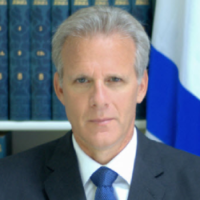Israel in a Dynamic and Changing Region: A Conversation with Ambassador Michael Oren
Ambassador Michael Oren, former Israeli Ambassador to the United States and current member of the Knesset, shared his analysis of Israel’s role in the Middle East.
On September 28, 2015, the Joseph and Alma Gildenhorn Middle East Forum of the Middle East Program at the Woodrow Wilson Center hosted the event “Israel in a Dynamic and Changing Region: A Conversation with Ambassador Michael Oren,” which was moderated by Aaron David Miller, Vice President for New Initiatives at the Wilson Center. Henri J. Barkey, Director of the Middle East Program at the Woodrow Wilson Center, provided opening remarks.
Miller began the conversation by asking Oren if the Israeli evaluation of the Iran nuclear deal was either a historic catastrophe or a historic breakthrough. Oren expressed his hope for the agreement’s success in delaying Iran’s ability to produce nuclear weapons and changing Iran’s behavior, but stressed his underlying skepticism. He pointed to Iran’s latest intervention in Syria and Iran’s relationship with Hezbollah. Oren highlighted how the immediate challenge for Israel is the $150 billion in sanctions relief Iran will receive as part of the deal, which could be used to fund Hezbollah. He also mentioned the greatest issues with the nuclear agreement are not just in the terms of the deal but in the language of the accord as well. He said the agreement bestows legitimacy on Iran, despite Iran’s aggressive behavior in the region.
Miller then initiated discussion on the internal issues Israel faces, asking Oren what troubled him most about the future direction of Israel and conversely, what about Israel inspired the most confidence. Oren replied by explaining internal issues such as housing prices, income gaps, the future of youth, and maintaining a sense of national coherence and a viable economy are the most pressing issues for Israel, despite the security threats Israel faces on all of its borders. He noted his hope for Israel is a consequence of the depth of Israel’s civil society and prioritization of family values.
Shifting the conversation to the Israeli-Palestinian issue, Miller asked Oren about the lack of a resolution with the Palestinians and what challenges this poses to the nature and character of the Israeli state. In his response, Oren distinguished between finding a solution and making progress toward a solution. He suggested a more informal approach to a resolution be taken—one that addresses what concessions both sides can make. Oren described the current state of affairs as a “two-state situation,” in which there is not peace but a degree of coexistence between the parties. This coexistence can be expanded and used to set the groundwork for a future two-state solution, he argued. For a future Palestinian state, he stressed the importance of establishing institutions and creating a viable economy, noting Israel’s role in this process. Oren concluded his remarks on the Israeli-Palestinian issue by stating his belief that Israel should not be building in areas that would be part of a future Palestinian state, differentiating this position from the position of the broader Israeli government.
Finally, Miller raised the subject of the U.S.-Israeli relationship and the measures of “no daylight, no surprises.” Oren explained “no daylight” to mean that while there are substantive differences between the parties, disagreements are kept private. “No surprises” represents the Israeli expectation of the United States to inform Israel of the content of its public policy statements relating to Israeli interests and security prior to making them. Oren asserted that the present U.S.-Israeli relationship has been all surprise, referring to the Obama administration’s policy decision not to keep Israel informed. In response to Miller’s question about whether or not Israel bears any responsibility for the nature of the relationship throughout the past seven years, Oren stated that although Israel has surprised the United States as well, these actions were mistakes and not expressions of policy.
By Nishaat Shaik, Middle East Program
Speakers

Israeli Ambassador to the US (2009-2013); Member of Knesset (2015-2019)

Senior Fellow, Council on Foreign Relations

Hosted By

Middle East Program
The Wilson Center’s Middle East Program serves as a crucial resource for the policymaking community and beyond, providing analyses and research that helps inform US foreign policymaking, stimulates public debate, and expands knowledge about issues in the wider Middle East and North Africa (MENA) region. Read more


